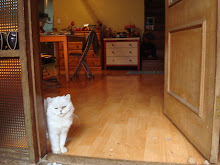Kim In-soon who is popular as Insooni is one of the most acclaimed singers in South Korea and if you have never heard of her just click the link above, she has a soulful voice, really!
She was born in 1957 to a Korean mother and an African-American father (who left them), serving as a GI in the American army. She was raised single handedly by her mother and went through many difficulties and constant discrimination mainly for being biracial and dark skinned - that too in 1960s when women marrying foreign men wer e looked down upon and had a very low social status. She discontinued her schooling after completing high school because of the discrimination and bullying she constantly faced. In her teens she was helped by a USFK member and his friends who gave her food, clothes and a shoulder to cry on. When he moved back to the US, the contact/link broke. However, the good news is that she was reunited after 40 years with that American GI who helped her when she was very young and was struggling ...READ HERE.
There are quite a few stories of biracial kids from South Korea who have made headlines around the world. Hine Ward is one of them and within the Korean context, no discussion on biracial families/children will be complete if we minus Hine Ward's saga.
Actually, the issue of biracial Korea came to the limelight when Hine Ward (also born to a Korean mother and an American GI ) - a pro-football player and a household name is the US - visited South Korea in 2006 for the first time and drew nationwide attention. On that visit, he talked with the President about the sufferings of biracial children/families and their status in Korea and that led to a new phenomenon (also known as the Hine Ward Factor).
James J. Na wrote in Seattle Times in 2006 wrote about Hine Ward's saga that:
"... Some multiracial South Koreans, especially those with dark skin, expressed bitterness at all the attention Ward garnered. These mixed Koreans, who still struggle with daily discriminations, think that the Ward story is essentially an American one, impossible in South Korea, despite the rhetoric of Korea's globalization. They fear, probably accurately, that the new awareness will subside shortly.
Underneath the glitzy exterior of economic success and high-tech development, South Korea is still a clannish society that values family ties and ethnic purity. Women who marry American soldiers are derided as "GI princesses"; those who marry blacks are scorned as little better than prostitutes. Mixed children, especially those with African or Southeast Asian ancestry, face taunts, impolite stares, spitting and other indignities. Many drop out of school and become unemployed."
Since then, many new laws have been introduced such as: "Basic Law regarding the Better Treatment of Foreign Residents in Korea (2007) and Support for Multicultural Families Act (2008)" and wide ranging research is carried out on academic level on multiculturalism etc. Korea's 2% of the entire population is foreign born and multicultural families and their children make up 20% out of these 2 million. Children born out of such marriage (also referred as international marriages ) are now coming of age where current laws, rules, regulations and the way things are done in Korea will do them more harm than good.
For many readers, it will be interesting to know that there is a separate school: Multicultural School in Gyeonngi-do for biracial children. This is very discriminatory in a way. If that is how one can assimilate the biracial children in a country then it is definitely a matter of concern. Every now and then, we hear that children of biracial backgrounds can NOT and DO NOT speak Korean well and have a long way to learn 'things Korean'....and this is a narrative that the government (and many pure Korean people) has and is not letting it go but I have met many pure Koreans who can NOT speak Korean either for one reason or the other so are they any less or any more Korean?
Furthermore, a lot has to be done in the policy of assimilation of these multicultural families (or 다문화가정) in South Korea. Current government policies have undoubtedly improved the conditions but urgent measures are required on many fronts so that multicultural families feel as equal citizens in Korea.
Back to Insooni, she has done a lot of social work including constant support of orphanages and orphans etc. in Korea and has been a sort of a spokeswoman of all those with bi-racial background. She is a living example of the good, the bad and the ugly of being biracial in Korea.
By the way, Insooni is coming as a judge in a new program called Super Diva 2012 and for more detail check out this superb website on K-POP: allkpopdotcom.
Further Reading:
In Korean language, a fantastic blog post on H. Wards and his mother. It has great photos.


















 sarahinsouthkorea
sarahinsouthkorea
